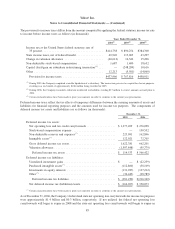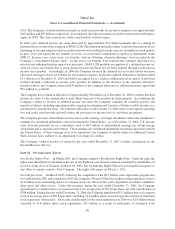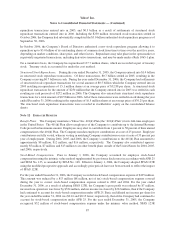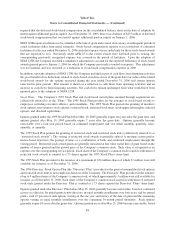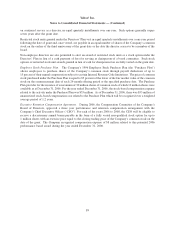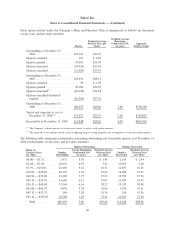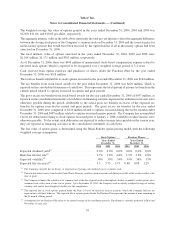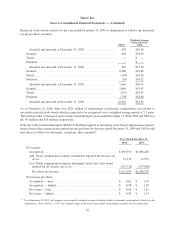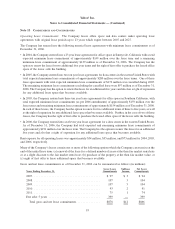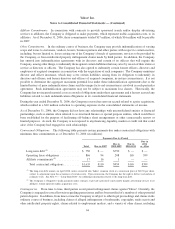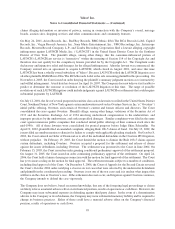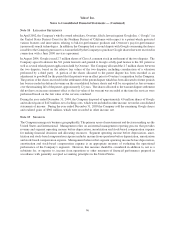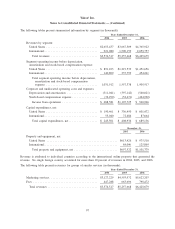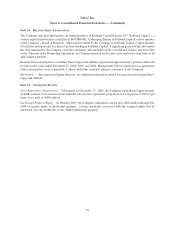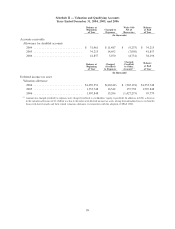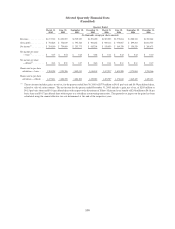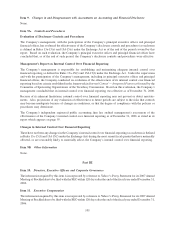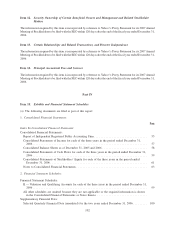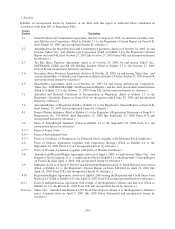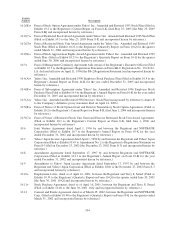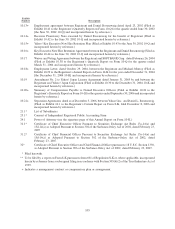Yahoo 2006 Annual Report Download - page 105
Download and view the complete annual report
Please find page 105 of the 2006 Yahoo annual report below. You can navigate through the pages in the report by either clicking on the pages listed below, or by using the keyword search tool below to find specific information within the annual report.claims alleging defamation or invasion of privacy, arising in connection with the Company’s e-mail, message
boards, auction sites, shopping services and other communications and community features.
On May 24, 2001, Arista Records, Inc., Bad Boy Records, BMG Music d/b/a The RCA Records Label, Capitol
Records, Inc., Virgin Records America, Inc., Sony Music Entertainment, Inc., UMG Recordings, Inc., Interscope
Records, Motown Record Company, L.P., and Zomba Recording Corporation filed a lawsuit alleging copyright
infringement against LAUNCH Media, Inc. (“LAUNCH”) in the United States District Court for the Southern
District of New York. The plaintiffs allege, among other things, that the consumer-influenced portion of
LAUNCH’s LAUNCHcast service is “interactive” within the meaning of Section 114 of the Copyright Act and
therefore does not qualify for the compulsory license provided for by the Copyright Act. The Complaint seeks
declaratory and injunctive relief and damages for the alleged infringement. After the lawsuit was commenced, the
Company entered into an agreement to acquire LAUNCH, which closed in August 2001, and since that time
LAUNCH has been a wholly owned subsidiary of Yahoo!. Because LAUNCH settled the LAUNCH litigation as to
all other plaintiffs, BMG Music d/b/a/ The RCA Records Label is the sole remaining plaintiff in this proceeding. On
November 4, 2005, the Court issued an order denying the plaintiff’s summary judgment motions as to interactivity
and willful infringement. A trial date has been set for April 16, 2007. The Company does not believe it is feasible to
predict or determine the outcome or resolution of the LAUNCH litigation at this time. The range of possible
resolutions of such LAUNCH litigation could include judgments against LAUNCH or settlements that could require
substantial payments by LAUNCH.
On July 12, 2001, the first of several purported securities class action lawsuits was filed in the United States District
Court, Southern District of New York against certain underwriters involved in Overture Services Inc.’s (“Overture”)
initial public offering, Overture, and certain of Overture’s current and former officers and directors. The Court
consolidated the cases against Overture. Plaintiffs allege, among other things, violations of the Securities Act of
1933 and the Securities Exchange Act of 1934 involving undisclosed compensation to the underwriters, and
improper practices by the underwriters, and seek unspecified damages. Similar complaints were filed in the same
court against numerous public companies that conducted initial public offerings of their common stock since the
mid-1990s. All of these lawsuits were consolidated for pretrial purposes before Judge Shira Scheindlin. On
April 19, 2002, plaintiffs filed an amended complaint, alleging Rule 10b-5 claims of fraud. On July 15, 2002, the
issuers filed an omnibus motion to dismiss for failure to comply with applicable pleading standards. On October 8,
2002, the Court entered an Order of Dismissal as to all of the individual defendants in the Overture IPO litigation,
without prejudice. On February 19, 2003, the Court denied the motion to dismiss the Rule 10b-5 claims against
certain defendants, including Overture. Overture accepted a proposal for the settlement and release of claims
against the issuer defendants, including Overture. The settlement was presented to the Court in June 2004. On
February 15, 2005, the Court issued an order granting conditional preliminary approval of the settlement proposal.
On August 31, 2005, the Court issued an order confirming preliminary approval of the settlement. On April 24,
2006, the Court held a fairness hearing in connection with the motion for final approval of the settlement. The Court
has yet to issue a ruling on the motion for final approval. The settlement remains subject to a number of conditions,
including final approval of the Court. On December 5, 2006, the Court of Appeals for the Second Circuit reversed
the Court’s October 2004 order certifying a class in six test cases that were selected by the underwriter defendants
and plaintiffs in the coordinated proceeding. Overture is not one of the test cases and it is unclear what impact this
will have on the class in Overture’s case. If the settlement does not occur, and litigation against Overture continues,
the Company intends to defend the case vigorously.
The Company does not believe, based on current knowledge, that any of the foregoing legal proceedings or claims
are likely to have a material adverse effect on its financial position, results of operations or cash flows. However, the
Company may incur substantial expenses in defending against third party claims. In the event of a determination
adverse to the Company or its subsidiaries, the Company may incur substantial monetary liability and be required to
change its business practices. Either of these could have a material adverse effect on the Company’s financial
position, results of operations or cash flows.
95
Yahoo! Inc.
Notes to Consolidated Financial Statements — (Continued)


